Over the past one to two years, card collecting has heated up and the sports card hobby has evolved to what it is in 2022. As we have seen before including during the Junk Wax ERA of card collecting, the hobby has the tendency to become extremely popular. However, it is hard to imagine the level the hobby would be in 2022. This includes the explosion of sports card grading, buying/flipping sports cards, and the overall value of sports cards. With the explosion of sports card grading, it has opened questions such as who wins BGS VS CSG or PSA VS CSG or PSA VS BGS.
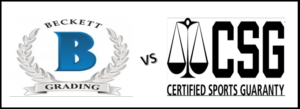
As new sports card collectors and sports card investors enter the hobby, the more the demand will be on the products as well as the need for sports card grading. With these grading needs, collectors, and investors, are left wondering who the best sports grading companies are? Two names that are for sure to be at the top of the list of the best grading companies are Beckett Grading Services (BGS) and Certified Sports Guaranty (CSG).
While you may have questions about sports card grading, you can check out our sports card grading guide to help you get started. Read on to learn more about which sports card grading company is better between BGS VS CSG and is it worth getting sports cards graded. In addition, you will get to see comp sales between CSG VS BGS.
BGS VS CSG Grading Guide: What Sports Card Grading Company to Choose?
What is sports card grading?
The sports card hobby and sports card industry continue to evolve from month to month and even from day to day. With these changes, it can be difficult for anyone to keep up with all the sports card hobby news including sports card grading. Luckily for you we have you covered. If you are new to the hobby and are wondering what sports card grading is, we have you covered.
Sports card grading is a process where the owner of a sports card submits the card to a third-party grading company such as BGS or CSG. The owner of the card pays a submission fee for the card to be examined, encapsulated within a slab, and a specific number grade assigned to the card. The card is then returned to the owner.
During this process the sports card or cards submitted for grading, will receive a grade between 1 and 10. In addition, other grades can also be obtained including sub grades that BGS provide and grades for the quality of the autograph. Once received, the owner can add the card to their personal collection (PC) or elect to sell the card on the various sports card marketplaces such as Check Out My Cards and eBay.
Sports Card Grading Companies:
The landscape of sports card grading is one that has taken a big turn over the past few years due to the growth of the hobby. Sports card grading companies such as BGS, PSA and SGC have been around the hobby for a while building their recognition as the best in the industry. Meanwhile new companies such as CSG and Artificial Intelligence sports card grading have also entered the scene.
In addition to BGS, CSG, PSA, and SCG, other new companies are also present and available for sports card investors and collectors. One suggestion before selecting a third-party sports card grading company is to take the time to research the company and what other collector’s successes, they have had with them.
Is it worth getting sports cards graded?
While you continue to learn about who grades sports cards and which sports card grading companies are the best, many other questions are asked about grading. One popular question that is asked is it worth getting sports cards graded? To answer that question, it honestly depends on what you are looking to do with the card and whether you can make money selling sports cards.
In most cases depending on the card, the quality of the card, and the grading company used, it is worth getting sports cards graded. However, in some cases it is not, and that is where understanding how sports card grading works and the costs involved are key. Prior to any submissions, take the time to research the cards you are interested in having graded and see how they are performing on the secondary market.
If you are planning on just building a collection or a set of high graded cards, it isn’t that important. On the flip side if you are a sports card flipper and are looking to make a profit, you must know how much a card will sell for graded by a company, how much a graded 9 sells for compared to a graded 10, and the fees involved.
Worth getting sports card graded example:
For example, say you have a rookie card of a player that is having a great year and you head to eBay or COMC to see how much the card is selling for. You notice an ungraded version is selling for $30 dollars whereas as a BGS 9 is selling for $150 or a CSG 10 is selling for $250. While you may not receive one of those grades, it is clearly worth getting graded if the card is in good shape.
Now you decide to have the card graded, the card which you believe will grade high is a 9.5 when returned. You sell it for $225 and your fees were only $30, you ended up making $195 compared to the $30 you could have sold it for ungraded.
BGS VS CSG Grading Guide: Quick Look at BGS and CSG
Now that you know in most cases sports card grading is worth it, you can turn your attention to the best sports card grading companies and learning more about each one. As new companies continue to enter the landscape, companies such as BGS and CSG along with SGC and PSA continue to be at the front of the pack.
We are here to look at two of the top sports card grading companies. Those two companies are BGS or Beckett Grading Services and CSG or Certified Sports Guaranty. BGS arrived on the sports carding scene in 1999 and has continued to deliver exceptional service and grading that meets or exceeds most of the other grading card companies. In addition to grading, Beckett also offers an online sports value book, storage option for collectors, and autograph authenticity.
On the other side, CSG is one of the new players to the sports card grading landscape after arriving in February of 2021. That said, CSG’s parent company Certified Collectibles Group (CCG) has been in the industry of grading for a long-time delivering grades to paper money through Paper Money Grading (PMG), coin grading through NGC and even CCG for comic books and magazines.
BGS VS CSG Grading Guide: Should you choose BGS or CSG for Sports Card Grading?
As you have come to learn about deciding on which sports card grading company to choose can be difficult. As you come to learn when comparing BGS VS CSG or PSA VS SGC or BGS VS PSA they all offer a good if not great service to the hobby. That said, a variety of different elements should be considered before making your decision on which company to use.
These elements that you should research including the type of sports card grading scale they use, the cost of sports card grading with those companies, the turnaround time to receive your card back, and the overall appearance of the final graded product. Lastly and possible the most important element to consider is comparing the comp sale prices between the two companies to see which one outperforms the other.
Here is a look at how BGS and CSG stack up against each other when comparing the various elements of sports card grading.
BGS VS CSG Grading Guide: Grading Scale
When looking at the sports card grading scale used in today’s sports card grading, most if not all the companies use the standard 1-10 sports card grading scale. This includes both BGS and CSG who grade their cards from 1-10 while also offering multiple grades for graded 10’s submitted.
Here is a look at BGS VS CSG grading scale.
BGS Grading Scale
BGS uses the standard 1-10 sports card grading scale with them focusing on their half point designation for 9. Furthermore, BGS also options to have subgrades added to the graded card for a higher fee or a single overall grade for a lower fee. The subgrades are graded on a half point designation while also helping determine if a card is a True Gem 9.5 or a Gem Mint 9.5.
Here is BGS grading scale:
Poor (1)
Good (2)
VG (3)
VG-EX (4),
EX (5)
EX-Mint (6)
Near-Mint (7)
Near Mint-Mint (8)
Mint (9),
Gem Mint (9.5)
True Gem (All 9.5 sub grades)
Pristine Gold Label (10)
Black Label (10).
Here is BGS subgrades:
Centering (1-10 including .5 increments)
Edges (1-10 including .5 increments)
Corners (1-10 including .5 increments)
Surface (1-10 including .5 increments)
CSG Grading Scale
Like BGS, CSG uses the 1-10 grading scale while also deliver .5-point increments for cards from 1.5 to 9.5. In addition, CSG offers both a Gem Mint (10) and a Perfect (10).
Poor (1)
Fair (1.5)
Good (2)
Good + (2.5)
Very Good (3)
Very Good + (3.5)
VG/EX (4)
VG/EX + (4.5)
Excellent (5)
Excellent + (5.5)
Ex/NM (6)
Ex/NM + (6.5)
Near Mint (7)
Near Mint + (7.5)
NM/Mint (8)
NM/Mint + (8.5)
Mint (9)
Mint + (9.5)
Gem Mint (10)
Perfect (10)
CSG Sportscard Graded Designations
Authentic – card is authentic and has not been altered (cut, trimmed, cleaned, recolored, or modified)
Authentic Altered – card is authentic and not reprinted, it has been altered).
Autograph Grades are assigned on a 5-10 grading scale.
Advantage: PUSH, both offer very similar grades and offer better graded 10’s then a standard 10
BGS VS CSG Grading Guide: Grading Fees
A second element of sports card grading that is key to understand and know is the grading fees associated with both grading companies. You may ask yourself how much does it cost to have sports cards graded? Knowing how much it cost, could help you determine which company to use, especially if you are looking to sell the card. Here is a look at BGS grading card fees and CSG grading card fees:
BGS Grading Fees
Premium $250
Premium – No Sub Grades $150
Express $150
Express – No Sub Grades $100
Standard $50
Standard – No Sub Grades $40
Economy $35
Economy – No Sub Grades $25
CSG Grading Fees
Unlimited Walk Through (Unlimited Card Value) $150 + 1% FMV
Walk Through (Card Value $50,000) $150
Express ($10,000) $70
Standard ($1000) $35
Economy ($500) $25
Bulk (50-card minimum / Card Value $250) $15
CSG Additional Grading Fees
Autograph +$2
Pedigree (With Proper Documentation) +$5
CSG Thick Holder (For Thick Cards) +$5
Premium Hi-Res Imaging (Photos of Graded Card) +$5
Advantage:
BGS VS CSG Grading Guide: Grading Time Frame
As the demand fluctuates for sports card grading, the time frame to have your graded cards graded and return may vary. This is something all sports card collectors who are looking to have cards graded should know especially anyone looking to immediately sell the card. Always refer to the BGS website and CSG website for up-to-date time frames. Here is a look at the current turnaround times for BSG and CSG.
BGS Turnaround Times
Premium Submission 5-7 Business Days
Express Submission 10-15 Business Days
Standard Submission 20-30 Business Days (As of May 18th, 2022)
Economy Submission 90-120 Business Days (As of May 18th, 2022)
*All turnaround times are estimated.
CSG Turnaround Times
Unlimited Walk Through 3 Days
Walk Through 3 Days
Express 7 Days
Standard 15 Days
Economy 25 Days
Bulk 40 Days
Autograph No additional Days/Same as above
Pedigree (With Proper Documentation) No additional Days/Same as above
CSG Thick Holder (For Thick Cards) No additional Days/Same as above
Premium Hi-Res Imaging (Photos of Graded Card) Same as Above plus 10 working days
Advantage: BGS
BGS VS CSG Grading Guide: Graded Slabs & Graded Labels
BGS White Label (8 or lower)
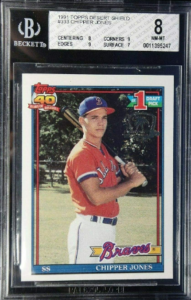
BGS Silver Label (8.5 or 9)
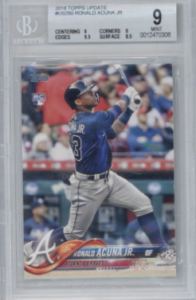
BGS Gold Label (9.5 or 10)
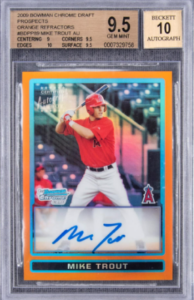
BGS Single Grade (No Subgrades)
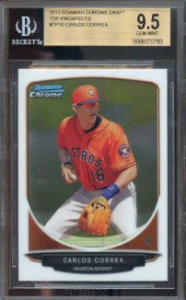
BGS Black Pristine Label
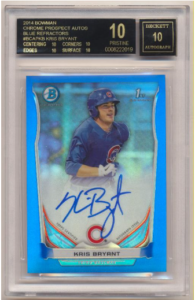
CSG Perfect 10
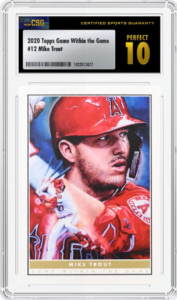
CSG Reverse Label
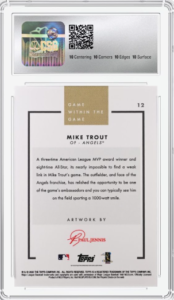
CSG Label (Not 10 or Perfect)
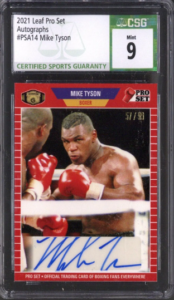
BGS VS CSG Grading Guide: Comparing eBay Sales
While other elements are important in the battle between CSG VS BGS, possible the most important depending on whether you are a collector or investor is eBay Sale comps. For example if you are looking to flip a sports card for a profit, you will want to go with the grading card company that has the higher resale value. For example if you are grading a Tom Brady Rookie Card, if BGS 9’s are selling for $1,000 and CSG 9’s are selling for $500 it would be a strong deciding factor.
Here is a look at two different cards from two different sports but the same graded value from BGS and CSG.
Lamar Jackson 2018 Panini Donruss Rated Rookie #317 (BGS GEM MT 10 VS CSG Gem Mint 10)
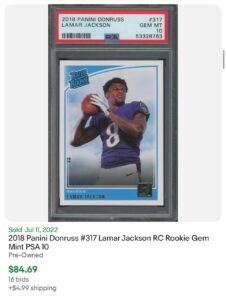
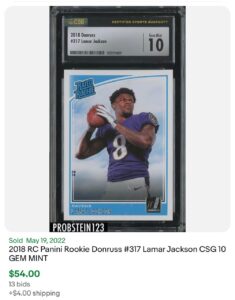
JA Morant 2019-20 Panini Chronicles #116 (CSG Gem Mint 9.5 VS BGS GEM Mint 9.5)
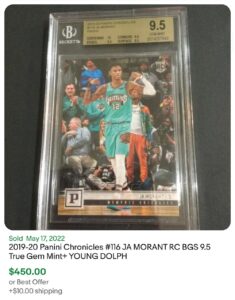
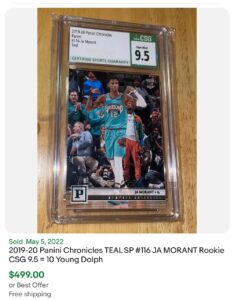
BGS VS CSG Grading Guide: Our Thoughts on BGS VS CSG
As you look at both BGS and CSG, you come to see why both third-party grading companies rank near the top within the industry. They both offer great service to their customer, both deliver premium encapsulated slabs, and both add value to the owner or seller. In the end, it simply comes down to you the collector and what you are looking for out of the graded submission.
If you are looking to build a PC of graded cards that are protected, both may meet your needs. However, if you are looking for an increase in resale value or potential future investment opportunities, BGS stands out based on the current track record of comp sales between similar cards on eBay.
Take the time to do your math based on these comp sales and fees to have card graded, while seeing which option is best for you. With that said, it is nearly impossible to determine what the sports grading landscape will be in the future. For now, though BGS and CSG both look to be at the front of the pack.
[ Grade your cards with AI in real-time >> https://bit.ly/3SMSfxV ]




1 Comment